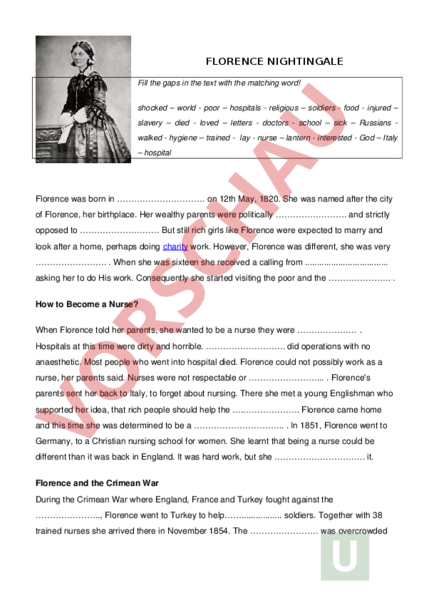Arbeitsblatt: Florence Nightingale
Material-Details
Gap text and exercises to follow listening exercise.
Englisch
Lesen / Literatur
8. Schuljahr
3 Seiten
Statistik
179624
748
4
09.03.2018
Autor/in
Kein Spitzname erfasst
Land: Schweiz
Registriert vor 2006
Textauszüge aus dem Inhalt:
FLORENCE NIGHTINGALE Fill the gaps in the text with the matching word! shocked – world poor – hospitals religious – soldiers food injured – slavery – died loved – letters doctors school – sick – Russians walked hygiene – trained lay nurse – lantern interested God – Italy – hospital Florence was born in . on 12th May, 1820. She was named after the city of Florence, her birthplace. Her wealthy parents were politically . and strictly opposed to . But still rich girls like Florence were expected to marry and look after home, perhaps doing charity work. However, Florence was different, she was very . When she was sixteen she received calling from . asking her to do His work. Consequently she started visiting the poor and the . How to Become Nurse? When Florence told her parents, she wanted to be nurse they were Hospitals at this time were dirty and horrible. . did operations with no anaesthetic. Most people who went into hospital died. Florence could not possibly work as nurse, her parents said. Nurses were not respectable or . Florence parents sent her back to Italy, to forget about nursing. There she met young Englishman who supported her idea, that rich people should help the . Florence came home and this time she was determined to be In 1851, Florence went to Germany, to Christian nursing school for women. She learnt that being nurse could be different than it was back in England. It was hard work, but she it. Florence and the Crimean War During the Crimean War where England, France and Turkey fought against the , Florence went to Turkey to help. soldiers. Together with 38 trained nurses she arrived there in November 1854. The was overcrowded and filthy. There were not enough beds, so men . on the floor. There were no proper toilets. Rats ran everywhere. The smell was terrible. Florence said: Without good , sick men cannot get better. Without clean bandages, clean beds and clean water, many from diseases. Florence worked 20 hours day. She went to the town to buy fresh food. She started to clean kitchens, and paid workmen to clear the drains. Soon the hospital was cleaner, and fewer men were dying. Walking with the Lamp At night Florence around the wards, to make sure the men were comfortable. She sat with dying soldiers. She wrote home for men who could not write. She always carried ., so the soldiers called her The Lady with the Lamp. Back in England Back home Florence made careful study of all the facts. All this time she had believed the . were sick because of bad food and poor working conditions. Finally she understood they were sick because of poor Florence decided to use this information to change all over England. She wrote hundreds of letters to important people about needed changes. And she started the first training . for nursing in the country. She also wrote the book ‘Notes on Nursing that spread her ideas around the Florence Nightingale died on 13th August 1910. 1) A) COMPLETE THE PERSONAL INFORMATION Name: Profession: In 1851_ In November 1854 She was called In 1910 Answer the Questions 1) When and where was Florence Nightingale born? 2) Who was Florence Nightingale? 3) Did she work hard to improve hospital conditions? 4) Why was she called The Lady with the Lamp? 5) How old was Florence Nightingale when she died? Order These Events in the Life of Florence NightingaleDuring the Crimean War, she was nicknamed ‘The Lady with the Lamp. She went to nursing school in Germany She was born in Florence, Italy, which is how she got her name Her family didnt want her to become nurse Describe what her main life achievements are: Choose one famous caregiver/doctor and write his/her autobiography: Albert Schweitzer Mother Teresa Beat Richner
